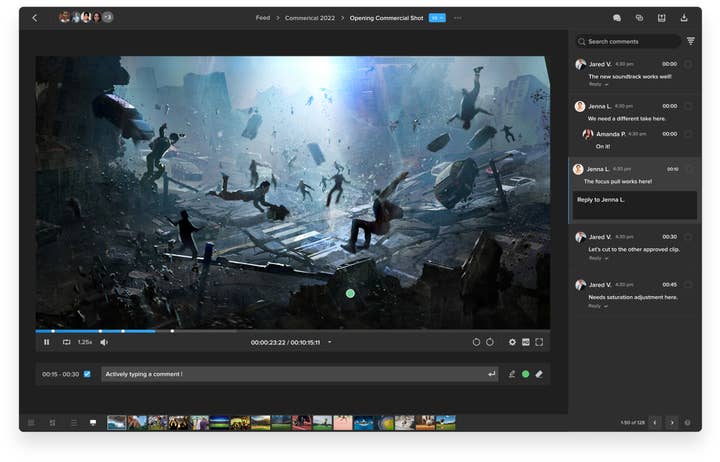Discover the tool that can speed up marketing approvals and help prevent video game leaks
Shift Media explains how its MediaSilo platform can stop the pain points companies run into when working on marketing campaigns
It’s an exciting time to be working on a video game.
Despite the economic doom and gloom, there has never been a better time to release and market a game. Audiences around the world continue to grow, and with an increasing number of social media platforms and technologies, there are now more ways to reach potential fans than ever before.
But there are a number of problems that companies can run into when they are in the midst of preparing a video game for release.
Perhaps the biggest concern for games companies right now is information about their upcoming products leaking before they have a chance to be announced. Though in some high-profile cases, leaks are the result of a cyberattack – such as the videos of Grand Theft Auto 6 in-development gameplay footage being published in September 2022 – much of the time, it is marketing materials that give the game away.
Leaks can ruin a marketing plan and ultimately give companies less control over the story they want to tell about the game in question.
As a result, it’s vital that companies use services that have rigid security to limit who has access to files and what they are able to do with them. You don’t want someone to have asset permissions who is not meant to – someone who could then share them on social media platforms or to press.
Disorganization also poses a risk for companies. Depending on what kind of assets you are preparing to help promote your game, you likely will be dealing with a variety of different tools, creative suites and storage solutions.
Tracking down individual files or specific variants of assets can therefore become a tricky process. Not being organized can result in unnecessary delays, as well as confused feedback between different departments or teams at a company. When the pressure is on to deliver assets for approval by a certain date, it’s always best to have a framework that prioritises organization.
You’ll also need a system that allows for different projects to have different spaces, as well as one that has versioning to ensure that changes are made and that the correct iteration of an asset is released rather than an older one. Games journalists frequently get sent assets, only for a ‘recall’ to be issued moments later.

One of the other big challenges that companies might run into when building their marketing pushes is collaboration. Especially for blockbuster titles, there will be a huge number of people that need to give feedback on assets for a particular campaign.
For example, studio heads, publishing execs, marketing and PR directors, community managers and more will all need to weigh in on how a particular game is being promoted. If you are working with external companies such as creative or marketing agencies, they will also need oversight on assets, and if you happen to be working on a licensed IP, then the licensor will have to have a say on how their property is presented.
In short, managing the sheer amount of feedback coming from seemingly every direction can be a challenge that slows down progress on creating a campaign, meanwhile comments without the appropriate context can result in confusion that will end up with incorrect assets making their way into the wild or slow down the approval process.
The final pain point is how companies can create presentation materials to show their work to top-level executives and partners. This can be early in the process or close to the end, but will often require a variety of tools coming together to create a seamless experience, often resulting in formatting issues. This also applies to sharing assets with press once a game is entering its announcement and preview phase.
These are all issues that Shift Media’s MediaSilo service can assist with. The company has worked with nearly all the major TV and film studios and broadcasters in the world. It is also building a presence in the video games space.
MediaSilo is a way for companies to present, organize and secure their work. Allowing developers and publishers to share assets with all of the people who need to cast their eyes over them and eventually publish them to the world. If a creative agency needs to submit assets to the marketing team at a game studio at a specific time of day in a different timezone, that’s possible – the risk of missing deadlines disappears entirely. It allows them to handle assets in an organised manner, too.
Using MediaSilo, companies can add and manage videos, images, audio and other documents to various workspaces for individual projects. It also works with your existing tools, such as the Adobe Creative Cloud suite. Having seamless integration with existing platforms and services reduces the hassle that comes with preparing assets for release. Designers and creatives do not need to worry about making their tech work with MediaSilo and instead can focus on making the best material possible.
The platform also makes collaboration easy, allowing users to review content and leave feedback in an organized manner on all assets. Parties can leave annotations on images and assets detailing changes that need to be made; when it comes to video material, comments can be timestamped so that you know exactly what the feedback relates to. Integration with Adobe Premiere Pro means that comments will sync with your timeline so that video editors can easily action feedback. As a result, there’s no need for creatives to be flicking back and forth between different windows in order to find the comments they need to execute. All of this information is present within Premiere Pro itself, with feedback tied to specific timestamp annotations meaning that there is no need to second guess what someone is referring to in their comments.
In addition, you can get feedback using review links, which can be customized to limit who can view the content.
Links and content can be made public, can be password protected as well as be set to expire after a certain date. Users can also determine whether content can be downloaded. Furthermore, video footage can be protected using personalized visible and forensic watermarks using MediaSilo’s SafeStream technology. In the future, users will also be able to add watermarks to images, reducing the likelihood of leaks to nearly zero. You need only think of Rockstar’s recent woes with leaked internal gameplay videos of the still-in-development Grand Theft Auto 6 to see just how vital security protocols like these are.
"You do not need to spend hours building presentations, content portals or press kits from scratch thanks to the high-quality templates"
The Insights tool means that you can also see who has accessed links and content. With this, you can keep track of what review links have been sent out, who sent them, how many approvals were provided on it as well as what presentations have been sent out. You can also see who has opened links and how many people downloaded them, allowing you to keep track of whether agency partners and so on are reading your feedback. It’ll also allow you to check that people leaving comments have actually engaged with the content you are sending. You also receive information about when people lose interest in a video – for example, if they stop watching after a minute – which is valuable data for producing polished and interesting assets.
On the flip side, users have a feed that shows them what files have been sent to them, what needs to be returned and fed back on.
MediaSilo’s Spotlight feature can be used to present materials to executives and other stakeholders for review. It can be used to create electronic press kits to share assets with streamers and game journalists when you are beginning your preview and marketing push. That’s on top of it being possible to create content portals via which games companies can share assets such as key art and video trailers with retail partners in order to help promote their game in-store.
There’s no need for any extra work here, either. You do not need to spend hours building presentations, content portals or press kits from scratch thanks to the high-quality templates, which provide a fast and easy way to produce this content in a professional-looking manner.
Though now is an exciting time to be working in game development and marketing, with it comes a level of complexity. You don’t want to be worrying about sending assets around the world or whether some key art or video trailer is going to end up in the wrong hands. Using MediaSilo lets you focus on what is important: making a high-quality marketing campaign for your next big release.
Visit www.mediasilo.com or contact sales@mediasilo.com for more information.
